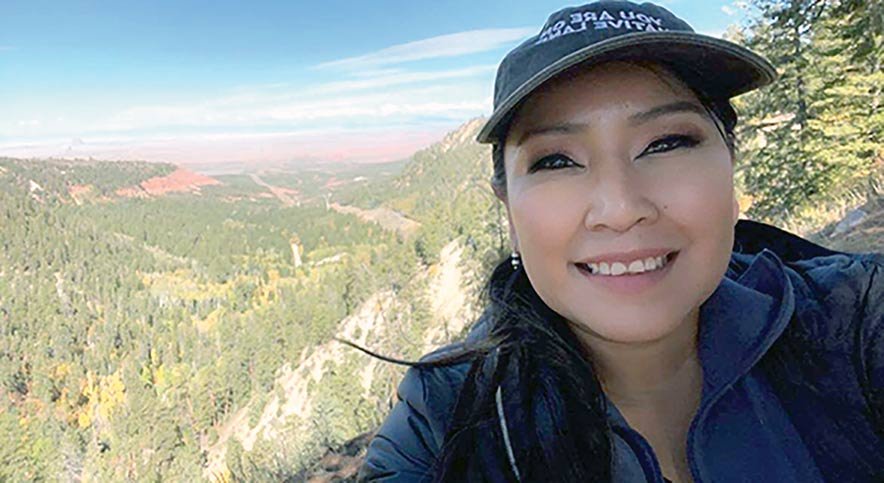Hołdzilei, a new business: Diné entrepreneurs earn REI grant for startup adventure company – Navajo Times
Select Page
Courtesy photo | Crystal Cree
Crystal Cree takes a selfie during a hiking trip near Buffalo Pass on the Chuska Mountains Oct. 9, 2021.
Posted by Krista Allen | Jan 20, 2022 | Business |
TSÉBIGHÁHOODZÁNÍ
Their company name embodies what it means to be a person who can transcend their circumstances.
Crystal Cree and Bryan Roessel’s Hołdzilei Hiking Strong, an adventure and hiking company, based in Tsééhílį, conveys that being strong doesn’t mean those who show strength but those who practice gratitude, define themselves, and stand within the dark places of life.
“We incorporate what it means to be a strong individual,” Cree explained. “Not just physically but also mentally, spiritually, and emotionally as you’re hiking, (and) relating this to who you are as a Diné.
“(Hołdzilei) can relate to life lessons and hardships that we go through in life,” she said.
Roessel, her business partner, said people’s increasing affinity for the internet, video games and television is causing them to disconnect from nature. This, in turn, contributes to problems such as obesity, behavioral conditions and mental illnesses.
People need to disconnect from their digital lives at least from time to time and get involved in unorganized play, and that’s what their company offers: an all-inclusive hiking experience in Diné Bikéyah, said Roessel.
“People miss out on the outdoors because of all this technology,” he said. “Nature has healing powers.”
Cree and Roessel’s company recently received a business grant from Embark, a program developed in collaboration with REI (Recreational Equipment Inc.) Co-op Path Ahead Adventures and Founded Outdoors.
“We’re pretty excited about it!” Cree exclaimed. “We just started our company.”
Hołdzilei Hiking Strong LLC was incorporated in the Navajo Nation in November 2021, during which the young business partners applied for Embark.
“After we submitted our application, two days (later), we got our incorporation from the Navajo Nation,” Cree said. “We’re pretty excited about that.”
After submitting their Embark application on Nov. 28, 2021, the Embark program selected Hołdzilei Hiking Strong as a finalist and invited Cree and Roessel to a 30-minute interview on Dec. 7.
Embark notified the young business partners of their acceptance into the virtual three-month program on Dec. 20. Cree said she and Roessel started the program Tuesday, Jan. 17, 2022.
The program is designed to fuel new and aspiring entrepreneurs as they build a path forward by offering the resources and guidance to turn early-stage ideas into viable businesses, according to the Embark website.
Embark awards $5,000 to participants – or founders – at the start of the program so they can build their businesses.
When they complete the program, the participants will receive an additional $5,000 to invest in building their companies.
Embark’s weekly programming comprises workshops, fireside chats, and peer groups in which participants work with a small group of founders to overcome roadblocks, problem solve and share learnings.
Cree said the only roadblock was registering Hołdzilei Hiking Strong with the Navajo Nation. The Division of Economic Development office didn’t answer her and Roessel’s calls.
“We kept bugging them,” Cree said. “We submitted our application in mid-October, and we were told it’d take 10 days. We waited for 10 days, and then we called.”
The two had to wait a little longer because the office had to replace an employee who did the certifications.
“It took an overall six weeks to get our business incorporated,” Cree explained. Luckily, we didn’t have any mistakes on our paperwork.
“Just an advice to new businesses: don’t hesitate and keep bugging them,” she added.
Hołdzilei Hiking Strong was one of 240 applicants that applied for the Embark program, and it was one of 16 applicants accepted.
“We were the only Native American company, Navajo-owned,” Cree said. “(Though) there is one other company that’s Indigenous.”
Cree and Roessel said that because they enjoy hiking, they decided to start an adventure and hiking company that offers premier hiking trips across Diné Bikéyah and focuses on connecting to the land.
“My father used to take me hiking a lot on the Navajo Nation,” Cree said. “He used to teach the Native plants that are out there, and (say), ‘If you get lost, look for this’ or ‘These are wild carrots, and these are wild onions.’
“I’m so used to being outdoors,” she said. “Hiking has always been part of my life. It’s something (my family and I) did almost every weekend. As I got older, we advanced to backpacking.”
Cree said she met Roessel at Diné College, where her friends and colleagues encouraged her to start a hiking club. She started the club and invited her friends and other students to get involved, but her outreach effort went down the drain because of the coronavirus pandemic.
“But I still made it an effort to go on (weekly) hikes,” Cree said.
She started sharing her hiking stories and business idea with her supervisor, Diné College President Charles Roessel, Bryan’s father.
“He was like, ‘Bryan likes to hike.’ And we coordinated some of our friends to go on a hike at Zion National Park last year,” Cree said. “(Bryan and I) became friends, and over the past year, we shared ideas about hiking, and his dad was like, ‘Why don’t you guys start a hiking company?’ We just ran with it.”
Bryan Roessel has always wanted to start an adventure company in the Nation. Growing up in Tódinéeshzhee’ and in the Tsébii’ndzisgaii area, a tourist destination, inspired him to begin planning for a guided tour company early in his life.
Roessel said when he was younger, he led a guided backpack tour unintentionally through Navajo land after meeting tourists at Kayenta Monument Valley Inn.
“I had a truck with packs in it ready to go, and some tourists (walked up and asked), ‘Hey, can we go?’ At the end, they gave (me) money. That’s how it all started,” Roessel said. “(The tourists) said, ‘You really need to charge for this. This is wonderful! We had a blast. Thank you.’”
To date, he’s led more than 10 guided backpacking trips, each lasting up to four days.
The best part of it all, he said, is that visitors get to see the stunning views of Navajo land, where he grew up playing on the rocks.
“Once Crystal and I started hanging out and going on hikes, we started talking and taking (the hiking company) seriously,” Roessel said. “Sure enough, everything just fell into place. ‘Let’s do this! Let’s do this!’ We started a business and applied for the LLC.
“Then suddenly we hear about the (Embark) grant, and we’re like, ‘We should apply! Let’s do it!’ So, we did, and Crystal sent in the application, and we heard back and got accepted. Then it came time for the interview, and we made the final round. Now, we’re starting the program.”
There are likely hundreds of hikes in Diné Bikéyah: over the Chuska Mountains, over White Mesa in Western Navajo, from Naatsis’áán to Rainbow Bridge, and from Tsaile to T’iis Názbąs, to name a few.
Cree said her favorite hike is over the Chuska because it takes people through an area that only a few get to see.
“That’s why it’s one of my favorite places to hike,” Cree said. “For many Navajos, it could be a place to help reconnect to the land.
“One of our (company’s) philosophy is making sure that people we host on these hikes understand and respect our Diné Bikéyah,” she said, “and that they understand certain practices that we have.
“And acknowledge within our perspective what not to do and what you should do,” she said. “We want to offer that through our company. We want to inspire others to be appreciative of the land and to take care of it.”
Cree said Diné Bizaad is directly related to the land and to the Diné, and those who take a trip with Hołdzilei Hiking Strong will understand that.
“We say we are children of the Holy People, that’s directly related to the land,” Cree explained, “and the Creation story about our leaders: (Mą’iitsoh, Náshdóíts’ǫǫį, Shash, and the four sacred mountains, respectively). They are still our leaders.
“So, in that connection to the land is the four sacred mountains,” she said. “That’s something that has been lost, (and) not understood,” she said. “The land is interchangeable with our language and who we are as a people.”
Cree and Roessel are employees at Diné College. Cree is from Tónaneesdizí. She is Tsédeeshgizhníí and was born for Bįįh Bitoodnii. Her maternal grandfather is Tł’izíłání, and her paternal grandfather is Ta’neeszahnii.
Roessel is Bitáá’chii’nii (Táchii’nii) and born for Kinyaa’áanii. His maternal grandfather is Tódík’ózhí, and his paternal grandfather is Scottish.
Information: hikingstrong.biz
Share:
Rate:
Krista Allen, based in Kaibeto, is the assistant editor of the Navajo Times.
ADVERTISEMENT
More weather »  Highway 264,
Highway 264,
Window Rock  I-40, WB @ Winslow
I-40, WB @ Winslow  I-40, WB @ Butler
I-40, WB @ Butler  SR-77 SB @ Holbrook
SR-77 SB @ Holbrook
ADVERTISEMENT
Designed by Elegant Themes | Powered by WordPress




